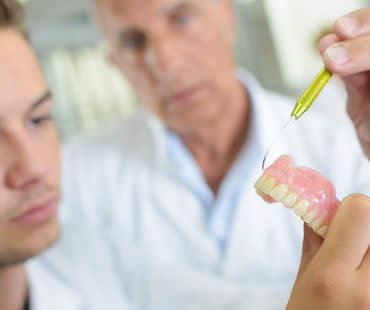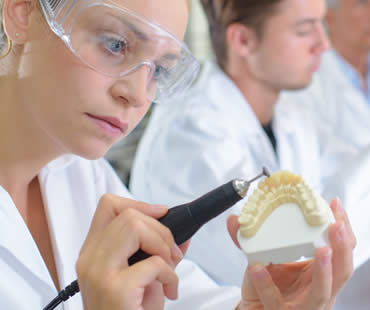
If you’ve been wearing dentures for a while, you may have some complaints. They might fit poorly and shift or click when you talk or eat. Poor fit can lead to discomfort and sores in the mouth that worsen over time, or they can collect food underneath them, leading to bad breath.
If this sounds familiar to you, there might be alternatives for you. One of the newest developments in dentures is the pairing of standard dentures with dental implants. The dental implants are placed directly into your jawbone, providing the kind of stability only previously offered by natural teeth. Dentures fixed in the mouth with dental implants become something new: hybrid dentures.
Dentures that utilize dental implants as their anchors are very stable. They enable denture wearers to enjoy foods previously denied them, such as crisp, healthy foods or chewy cuts of meat. Eliminating the food restrictions present for many denture wearers allows them to eat a wider variety of foods, helping to reduce the risk of poor nutrition and the poor health associated with it, including digestion difficulties.
Because of this increased stability, the denture itself can be made smaller. A standard denture covers the roof of the mouth completely, inhibiting the taste and texture of foods. A denture designed around dental implants, however, has an open roof and facilitates a greater enjoyment of foods of all kinds, as well as a more natural feel for your tongue.
Dental implants also stimulate bone by mimicking natural tooth roots. This stimulation allows the bone to continue to be strong and alive, whereas the bones of the face can begin to shrink once a tooth has been extracted. This bone shrinkage leads directly to poor denture fit. Dental implants used with dentures avoid this issue.
If you are a denture wearer and you’d like to see some changes in how your dentures fit, talk to your dentist to see how using dental implants can improve your denture experience.
If you live in the Fernandina Beach area contact us today

If you have chosen dentures to restore the function and appearance of your mouth, you certainly want them to do their job. Typically, if fitted correctly and you follow the instructions for use and care, dentures are a good solution. However, it’s possible for problems to arise so it’s important to recognize issues and how to handle them.
One key thing about dentures is that they must fit properly. If not, problems like gum irritation, difficulty eating and speaking, mouth infections, and denture movement may occur. Also, if you don’t keep your mouth clean and healthy, problems will likely appear.
If you experience any issues with your mouth after getting dentures, see your dentist right away. It’s possible that over time, your bones and gums can change and alter the fit of your dentures. When this happens, your dentist must determine if modification, adjustment, or replacement is needed. Never try to adjust your dentures yourself.
Here are some things you can do at home to keep your dentures in good condition:
- Handle them carefully. When holding your dentures, place a towel on the counter or stand over a water-filled sink. This will protect them if you drop them.
- Keep dentures out of reach of children and pets.
- Do not sleep with your dentures in your mouth.
- Clean them daily according to your dentist’s instructions. This includes soaking them overnight in a denture cleanser, cleaning them well each morning before wearing them, and cleaning your mouth carefully before inserting the dentures. Use a soft brush or one designed for dentures, plain soap or cleanser recommended by your dentist, and warm water. Never use bleach or household cleansers.
- Store your dentures in warm water or denture cleaning solution. Do not use hot water, which can cause them to lose their shape.
- Do not use toothpicks because they can damage dentures.
Wearing dentures may be tricky at first, and it may take some time to grow accustomed to them. However, if you care for them well and see your dentist for routine checkups, you can avoid most of the problems that denture-wearers sometimes encounter.
If you live in the Fernandina Beach area contact us today

An implant overdenture combines the use of traditional dentures and implant technology to create a denture that fits over your remaining natural tooth roots or dental implants. These root or implant supported dentures are held in place by dental attachments which provide excellent stability and support for your dentures. Overdentures were developed to help patients missing some or all of their teeth regain a quality of life that may have been lacking since they lost their teeth.
There are several benefits to implant overdentures when compared to traditional dentures:
- Saving your natural roots or having implants placed slows bone loss by stimulating the bone in your jaw when you eat or chew.
- Because overdentures are better fitting by design, they are more stable and allow you to chew food more thoroughly. This promotes better digestion and allows you to absorb more nutrients.
- The increased stability provided by overdentures also means you are able to speak more clearly, as there is no slipping or clicking of your dentures.
- Loose dentures are not a worry with overdentures. Sticky adhesives and messy denture creams are unnecessary when you have implant overdentures.
- With overdentures, the natural shrinkage that occurs from an under-stimulated jaw does not occur. This keeps your face from looking sunken, as can often happen with traditional dentures.
To find out if you are a candidate for implant overdentures, schedule an evaluation by your dental professional. Overdentures could be the best, most natural treatment for restoring your oral health and beautiful smile.
Our dental office is located in Fernandina Beach

Dentures have been around a long time as a way to restore smiles plagued by missing teeth. They provide a solution for people who want to smile, talk, and eat as normally as possible. Unfortunately, removable dentures aren’t without issues. They can become loose or shift, making it uncomfortable to eat and talk. Messy denture adhesives are bothersome and ineffective for some patients. Therefore, advancements in dental technology have developed the option of permanent dentures.
What are permanent dentures?
Permanent, or fixed, dentures are suitable for patients missing one, two, or more teeth. The appliance is made up of a row of crowns or artificial teeth, which are connected together and the framework is supported by dental implants. The implants act like natural tooth roots, and the permanent dentures create a bite similar to natural teeth.
What are the benefits?
Fixed dentures definitely offers some advantages to removable ones. The need for messy adhesives is eliminated, and you don’t have to worry about loose or ill-fitting dentures affecting you. The force of your bite is also improved, so you can eat all kinds of foods without concern. Because a permanent upper denture doesn’t cover the roof of your mouth, your ability to taste and enjoy food is not sacrificed. This kind of denture stays in place for normal oral hygiene, so there are no special cleaning or soaking requirements. If properly maintained, permanent dentures can last for many years or even a lifetime.
Are there any disadvantages?
Permanent dentures are susceptible to oral problems like infection or inflammation because they are not removable. Also, it is possible that the crowns may require replacement in 10 to 15 years.
We treat patients from Fernandina Beach and the surrounding area

No matter how much you want to preserve your real teeth, it’s not uncommon for people to lose teeth. It may occur with age, decay, gum disease, or injury. If this happens to you, there’s no reason to go through life missing teeth in your smile. It’s better to quickly see your dentist for replacement teeth, so that you avoid shifting of your remaining teeth, speech problems, or saggy facial muscles. One solution that your dentist will likely offer to restore your smile is dentures. Here are some tips to help you select the right dentures for you.
Dentist
An important step in the process of getting dentures is making sure you have a qualified and experienced dentist treating you. Most dentists provide dentures as part of their services, or you may choose to go to a prosthodontist. This type of specialist focuses on restorative dentistry. No matter who you choose, make sure that you are confident you will get dentures that meet your specific goals and needs.
Type of dentures
There are several types of dentures available, each with their own attributes. These are the main kinds:
- Full dentures – an acrylic appliance that replaces all of the teeth in your upper jaw. These are functional and replicate your real teeth, and are usually comfortable when fitted correctly.
- Partial dentures – these replace one or two missing teeth using a dental arch. Partial dentures are made of acrylic, metal, plastic, or a combination of these materials. These are attached with a clip that holds them in place in your mouth.
- Permanent dentures – these dentures are permanently attached and require almost no maintenance. They are the costliest of the types of dentures.
Color
Dentures are available in various shades of white so that you can select the color that is most natural for you. Be careful about choosing the brightest white color, which may look unnatural compared to the color of your real teeth. Your dentist will help you find a neutral color that looks best with your smile and complexion.
Our dental office is located in Fernandina Beach

Dentures have improved dramatically over the past several years. Whether it’s your first set of dentures or your fifth set, you probably have questions. Below are some commonly asked questions and answers about dentures:
- Will dentures change how I look? Today’s dentures are personalized to your mouth, making their appearance more natural than ever. Dentures also support your cheeks and lips, making you look years younger.
- Will dentures change how I feel? After a period of adjustment, dentures should make you feel more confident than ever.
- Will dentures alter my speech? While speaking may be difficult initially, with practice, your speech should quickly return to normal. Practicing reading and counting out loud will help to speed up the adjustment.
- Will dentures affect how I eat? Eating may take some practice, and you should start with a soft food diet while you adjust to the differences between eating with your natural teeth and dentures. Take small bites and try to chew on both sides of your mouth at the same time. Avoid hard, crunchy or chewy foods that can damage your dentures.
- How do I care for my dentures? Clean dentures daily, brushing immediately after every meal if possible. Use a soft brush and gentle cleanser, taking care to avoid hard abrasives. Be careful when they are out of your mouth not to drop them or clean them on hard surfaces.
- Once I have dentures, will I still need to see the dentist? Regular dental examinations and professional denture cleanings are vital to maintaining your oral health. Have your dentist periodically check the fit of your dentures to ensure they are comfortable and last for as long as possible.
- When will I need to replace my dentures? With care, dentures typically last 5-10 years. Because your mouth continues to change shape as you age and denture teeth wear down, you should have them checked yearly to avoid any significant problems.
Consult with your dental professional about any additional questions or concerns you may have about your future with dentures and your potential for a bright, new smile.
If you need a dentist in Fernandina Beach contact us today







